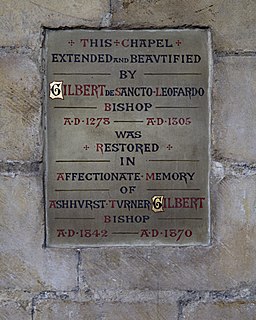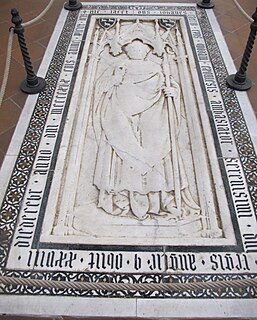Related Research Articles
John Langton was a chancellor of England and Bishop of Chichester.
Robert Waldby was a native of York and friar of the Order of Saint Augustine who followed Edward, the Black Prince into Aquitaine. After studying at Toulouse, he became professor of theology there.
Henry Ware was a medieval clergyman who became a diplomat and Lord Privy Seal for King Henry V of England from 1416 to 1418. He later became the Bishop of Chichester. Originally from Wales, Ware served as a canon from the 1390s and then studied law, of which he was made a master, at Oxford University. He later became an official in the court at Canterbury. He also spent some time in diplomatic missions to France. In early 1418 he was elected bishop of Chichester, and was consecrated in July 1418. He died in July 1420, between the 7th and the 26th.
Thomas Brunce was a 15th-century Bishop of Rochester and then Bishop of Norwich.

Robert de Stratford was an English bishop and was one of Edward III's principal ministers.
Thomas Rushhook was an English Dominican, bishop and chaplain to Richard II of England.
Philip Morgan was a Welsh clergyman who served as Bishop of Worcester (1419–1426), then as Bishop of Ely (1426–1435).
Seffrid I, sometimes known as Seffrid Pelochin, was a medieval Bishop of Chichester.
John of Greenford was a medieval Bishop of Chichester.
John Climping was a medieval Bishop of Chichester.
Stephen Bersted was a medieval Bishop of Chichester.

Gilbert de St Leonard was a medieval Bishop of Chichester.
William Lenn was a medieval Bishop of Chichester and Bishop of Worcester. The name Lenn was the old name for Lynn in Norfolk.
Thomas Polton was a medieval Bishop of Hereford, Bishop of Chichester, and Bishop of Worcester.
Simon Sydenham was a medieval Dean of Salisbury and Bishop of Chichester.

John Catterick was a medieval Bishop of St David's, Bishop of Coventry and Lichfield, and Bishop of Exeter.
Robert of Chichester was a medieval Bishop of Exeter.

Edmund Lacey was a medieval Bishop of Hereford and Bishop of Exeter in England.

Richard FitzJames was a medieval Bishop of Rochester, Bishop of Chichester and Bishop of London.
Reginald Brian was a medieval Bishop of St David's and Bishop of Worcester. He was the son of Guy Brian, Baron Brian, brother of Guy Brian the younger, and brother-in-law of Alice Brian, better known as Alice de Bryene.
References
- Fryde, E. B.; Greenway, D. E.; Porter, S.; Roy, I. (1996). Handbook of British Chronology (Third revised ed.). Cambridge: Cambridge University Press. ISBN 0-521-56350-X.
| Catholic Church titles | ||
|---|---|---|
| Preceded by John Catterick | Bishop of St David's 1415–1417 | Succeeded by Benedict Nichols |
| Preceded by Robert Reed | Bishop of Chichester 1417 | Succeeded by Henry Ware |
| | This article about an English bishop or archbishop is a stub. You can help Wikipedia by expanding it. |